Pre-employment screening helps recruiters find the best candidates by evaluating their skills and qualities objectively. This process minimizes bias and ensures that potential hires are evaluated based on merit.
This blog post provides a detailed comparison between Adaface and Maki People, two prominent assessment providers. Recruiters will understand the key differences and see which platform best suits their needs.
Explore this post with:
Table of contents
How does Adaface work?
Adaface is a pre-employment assessment platform designed to help recruiters evaluate candidates through conversational tests. With a focus on scenario-based and custom assessments, it offers a broad range of testing categories to suit various job roles.
Recruiters use Adaface to create customized assessments that align closely with job descriptions, ensuring relevant skills are tested. This approach helps in identifying the best talent while improving candidate experience with engaging, non-googleable questions.
Adaface also provides a comprehensive library of ready-to-use tests, covering multiple areas like programming, business skills, and aptitude. This diversity allows recruiters to choose the most suitable tests for their hiring needs, streamlining the recruitment process.
Adaface’s standout features include integrations with popular ATS systems and a robust proctoring setup including browser tracking, webcam proctoring, and location logging. These features work together to maintain test integrity and deliver accurate assessments.
How does Maki People work?
Maki People is a pre-employment assessment platform offering a range of tests. These include programming, aptitude, business, personality, language, and finance tests. The platform aims to help companies evaluate candidates' skills and abilities.
Users can create assessments by selecting from ready-to-use tests or customizing them with their own questions. Maki People supports various question types, including multiple-choice and coding questions. The platform also provides automated scoring for coding questions.
Some of Maki People's features include web proctoring, webcam proctoring, and location logging to maintain test integrity. They also offer ATS integrations and GDPR compliance for enterprise users.
However, Maki People doesn't offer situational judgment tests, typing tests, or AI-specific assessments. The platform also lacks features like conversational interfaces and mobile-friendly tests, which could impact candidate experience.
Adaface vs Maki People: Test libraries
Adaface and Maki People both provide extensive test libraries catering to various roles and skills. From programming and finance tests to language and personality assessments, these platforms aim to cover multiple aspects of candidate evaluation.
Using these test libraries helps recruiters make informed hiring decisions and minimize the risk of employee turnover. By testing candidates on relevant skills and aptitudes early in the recruitment process, you can focus on interviewing only the most qualified individuals.
Adaface's test library
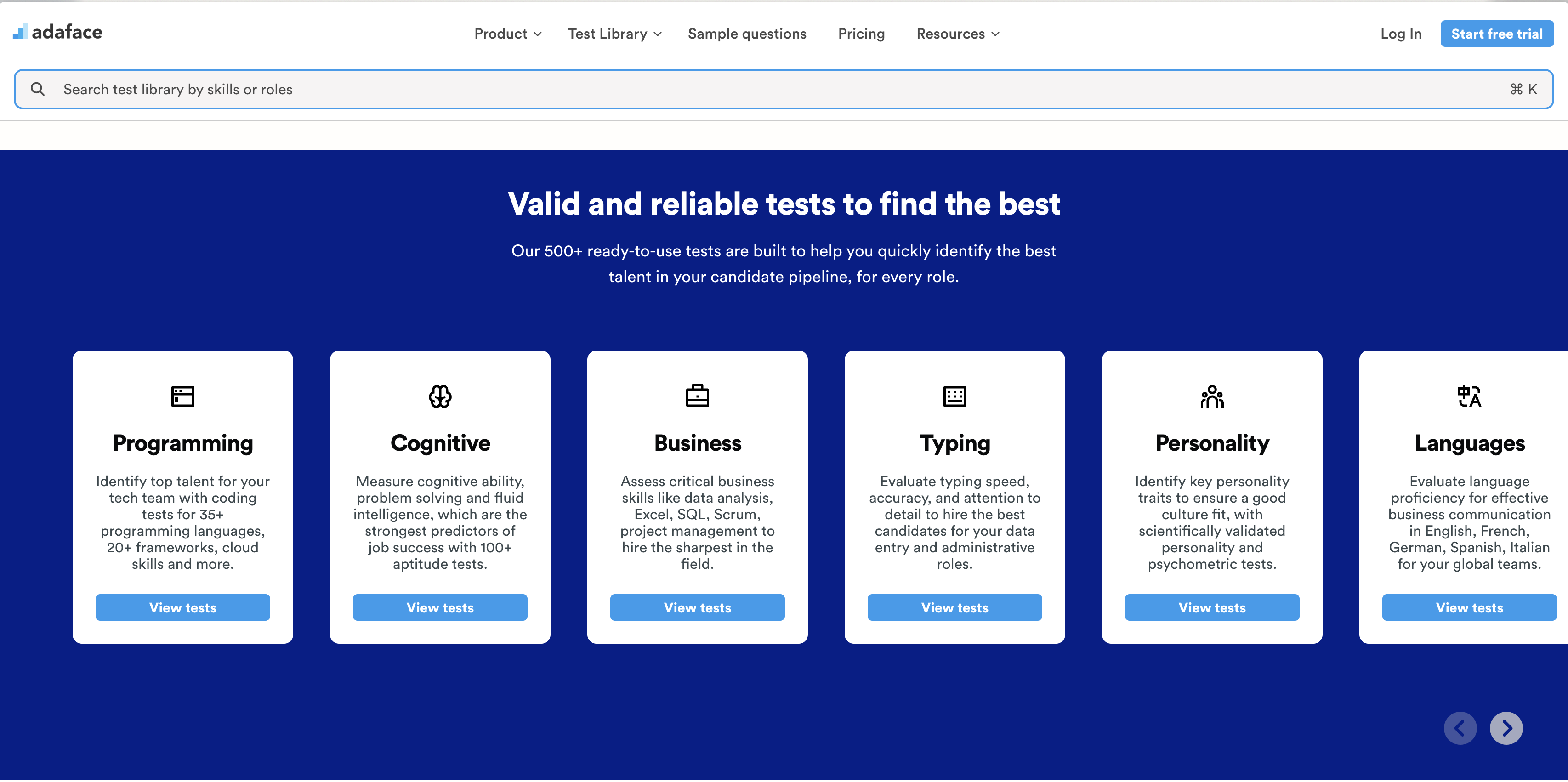
Adaface's test library stands out with its wide range of assessments and customization options. From Programming tests to Finance tests and Personality tests, Adaface provides an extensive collection of ready-to-use and custom tests.
Recruiters favor Adaface for its scenario-based questions and job-specific assessments, which ensure a more accurate evaluation of a candidate's real-world skills. The ability to create custom tests based on job descriptions makes it easier for companies to tailor the recruitment process to their unique needs.
With Adaface's library, you can quickly set up assessments for any role by choosing from hundreds of pre-built tests or customizing your own. Navigating and leveraging the library is straightforward, making your recruitment process smooth and efficient.
Maki People's test library
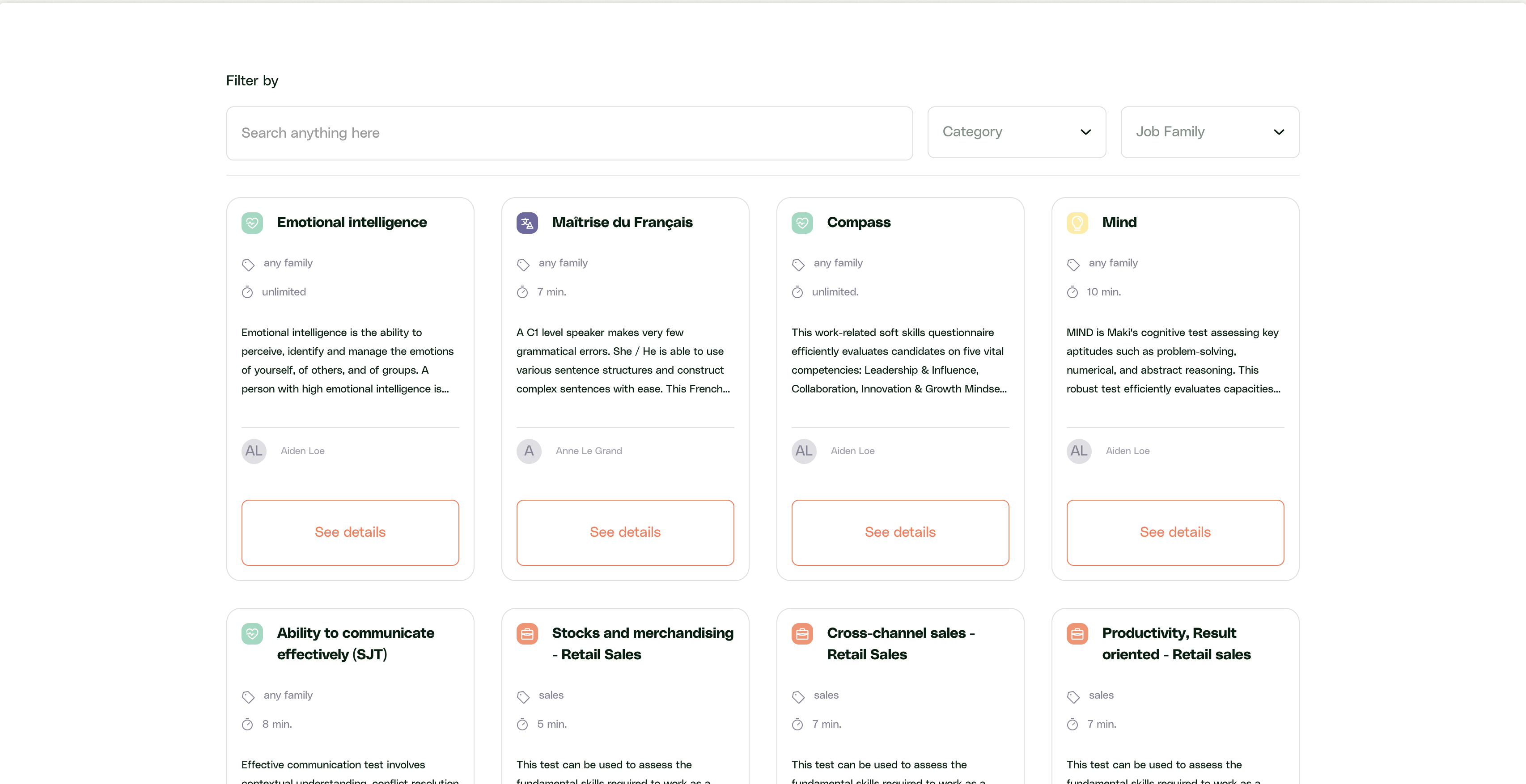
Maki People offers a diverse test library that includes programming, aptitude, and personality tests. They provide some job-specific tests and allow customization, but their offerings can be somewhat limited in scope.
One notable selling point of Maki People's test library is its ability to assess candidates through various aptitude tests and basic business skills. This means employers can gauge not just technical abilities, but also how well candidates might fit into a business environment.
However, Maki People falls short in certain areas, such as situational judgment tests and the ability to create customized assessments tailored to specific job descriptions. This could leave recruiters wanting more when it comes to accurately evaluating a candidate's fit for unique roles.
Comparison of test libraries
Adaface vs Maki People: Business, Marketing and Ops Roles
When it comes to hiring, assessing on-the-job role-specific skills is key to finding the right candidate. Recruiters rely on assessments to ensure that potential hires are ready to tackle day-to-day tasks.
Both Adaface and Maki People provide tools for evaluating these skills. However, Adaface offers a wider range of customized tests tailored to specific job descriptions, enhancing the hiring process.
Business, Marketing and Ops Roles with Adaface
Adaface's functionalities for screening skills include:
- Over 500 tests covering areas such as programming, business, aptitude, and languages
- Tests for specific roles like accounting and Excel
- Scenario-based questions and custom tests per job description
Recruiters choose Adaface to test actual role-based skills necessary for the job. By using scenario-based questions, Adaface helps improve test accuracy, ensuring candidates are well-suited for their roles.
Furthermore, Adaface allows for customization of tests to mirror your business needs. This adaptability ensures that tests can be tailored to specific roles, providing a more accurate assessment of candidate capabilities.
Hiring Business, Marketing and Ops Roles with Maki People
Maki People offers a diverse range of assessments catering to non-developer roles. Their test suite includes aptitude tests, personality assessments, and language evaluations, providing a broad spectrum of tools for hiring managers. They also provide finance and job-specific tests, although the selection is somewhat limited.
The test library at Maki People features ready-to-use tests that can help recruiters quickly deploy assessments. While their offerings are more generalized, they allow customization to an extent with options to add your own questions. This flexibility is beneficial for companies looking to tailor assessments to their specific needs, albeit within a limited framework.
However, Maki People lacks certain offerings that could enhance role-specific testing. The absence of situational judgment tests and typing tests can be a gap for roles requiring these skills. Additionally, the platform does not offer customized tests per job description, which might be a limitation for businesses seeking highly tailored assessments.
Adaface vs Maki People: Developer hiring
When hiring developers, you need to assess a candidate’s full range of technical skills to see if they align with your team and workload.
Look for a platform that offers a range of these tests, including coding and algorithmic-thinking challenges, and evaluates candidates’ ability to work with different frameworks and coding languages.
Hiring developers with Adaface
Adaface offers a holistic suite of functionalities for hiring developers, balancing coding questions with MCQs to evaluate hands-on skills and theoretical knowledge.
Maki People, on the other hand, focuses mostly on coding questions and lacks some advanced features like code playback and custom coding questions.
Adaface provides a diverse array of functionalities for hiring developers:
- Programming language coding questions and MCQs
- Web and mobile framework questions
- Data Structures and Algorithm questions
- SQL and Excel Workbook questions
- Code playback and automated scoring
- Custom coding questions
Explore Adaface’s programming tests for more details.
Recruiters rely on Adaface to hire developers because it offers a balanced mix of coding challenges and theoretical questions. This ensures comprehensive skill assessments.
Additionally, features like code playback and custom coding questions allow for more tailored and thorough evaluations, making Adaface a versatile tool for tech hiring.
For a broader overview, visit our Pre-Employment Assessment Test Library to discover more functionalities.
Hiring developers with Maki People
Maki People offers a range of programming assessments that cover popular languages and frameworks such as JavaScript, Python, SQL, and various web development technologies. Their platform is designed to evaluate candidates' coding skills through real-world problems, enabling employers to get a sense of how well a developer can apply their knowledge.
A notable feature of Maki People is their extensive test library. Employers can choose from a variety of pre-built tests to assess different skills, such as data structures and algorithms. This flexibility is useful for companies looking to tailor their assessments to specific roles or projects.
However, Maki People lacks support for mobile framework questions and doesn’t provide code playback functionality. Additionally, the platform does not offer options for custom coding questions, which might limit the ability to fully customize assessments according to unique hiring needs.
Comparison of developer hiring features
Adaface vs Maki People: Candidate experience and company branding
The candidate experience can make or break your hiring process. A poor experience leads to lower test completion rates and damages your employer brand.
Good candidate experience involves keeping tests short, mobile-friendly, and easy to use. It also means providing clear instructions and support for test-takers.
Candidate experience and company branding with Adaface
Adaface offers a unique conversational interface that makes assessments feel less like tests and more like friendly chats. This approach helps put candidates at ease and boosts completion rates.
The platform is mobile-friendly, allowing candidates to take tests on any device. Adaface also provides email support, online help docs, and FAQs to assist candidates. For enterprise clients, qualifying questions can be added to streamline the process.
These features combine to create a smooth, stress-free experience for candidates. This positive impression can improve your employer brand and attract top talent.
Candidate experience and company branding with Maki People
Maki People offers a straightforward candidate experience. Their platform supports email-based support for candidates and provides help documentation. This setup allows test-takers to get answers to their questions, either through direct communication or by referring to online resources.
For employers, Maki People's approach to candidate experience can be useful in certain scenarios. For instance, if you're running a high-volume hiring process where you need quick, no-frills assessments, their setup might fit the bill. The focus seems to be on getting the job done without too many bells and whistles.
However, Maki People's platform appears to lack some features that could enhance the candidate experience. There's no mention of a conversational interface, mobile-friendly tests, or qualifying questions at the start of assessments. These elements could potentially make the testing process more engaging and user-friendly for candidates.
Adaface vs Maki People: Anti-cheating features
Online assessments must have strong anti-cheating features to ensure candidates' test results are both accurate and fair. Effective proctoring tools help maintain test integrity by preventing dishonest behavior during assessments.
Anti-cheating features of Adaface
Adaface offers a range of proctoring features to safeguard the integrity of your assessments. These include:
- Webcam proctoring to monitor candidates visually throughout the test
- Browser tab and window tracking to detect if a candidate leaves the test page
- IP address logging to identify any suspicious patterns, such as multiple candidates using the same IP
- Time limits at the question level for precise scoring
- Copy-paste protection to prevent sharing of test content
- Chat GPT monitoring to detect unauthorized use of AI tools
One standout feature of Adaface is its scenario-based questions which are not easily googleable. This ensures that candidates are tested on their actual skills and not their ability to search for answers online. Additionally, Adaface's device fingerprinting helps to ensure that multiple candidates are not using the same device, adding another layer of security.
For more details, you can visit our remote proctoring features page or read our complete guide on online remote proctoring.
Anti-cheating features of Maki People
Maki People employs several anti-cheating features, including user authentication, time limits on tests, and web proctoring that tracks browser activity. They also utilize webcam proctoring and device fingerprinting to ensure candidates remain present and minimize the chance of collusion.
These features can reassure employers that candidates are genuinely participating in the assessment. For example, webcam proctoring can provide visual confirmation that the individual taking the test is who they claim to be, which is helpful in remote hiring scenarios.
However, Maki People lacks some significant proctoring measures, such as IP tracking and copy-paste protection. Without these features, there’s a greater risk of candidates collaborating or seeking help during assessments, which could compromise test integrity.
Comparison of anti-cheating features
Adaface vs Maki People: Pricing and free trial
Pricing for assessment platforms can vary based on features and scale. Recruiters should look for transparent pricing models to make informed decisions.
Adaface pricing
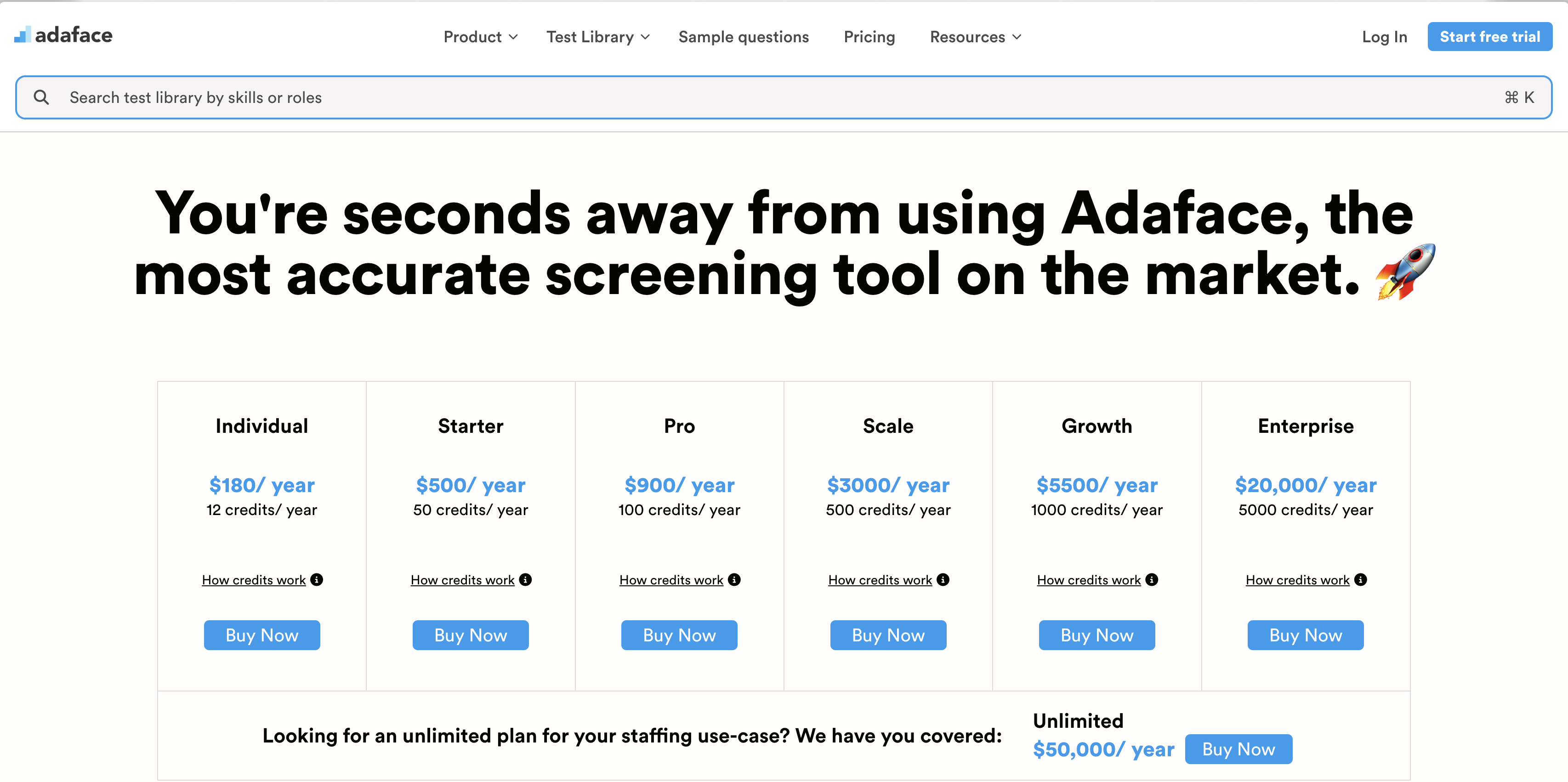
Adaface provide a free trial with two sample tests and 5 credits so you can explore all features before making a purchase decision. Adaface offers multiple pricing plans catering to different needs. From startups to large enterprises, there's something for everyone.
Our Starter Plan begins at $500 for 50 credits, perfect for smaller hiring needs. The Scale Plan offers 500 credits for $3000, suited for growing teams.
For more extensive requirements, the Growth Plan provides 1000 credits at $5500. We also offer an Enterprise Plan at $20000 for 400 credits, and an Unlimited Plan at $50000 per year. You can explore all our plans on our pricing page.
Maki People pricing
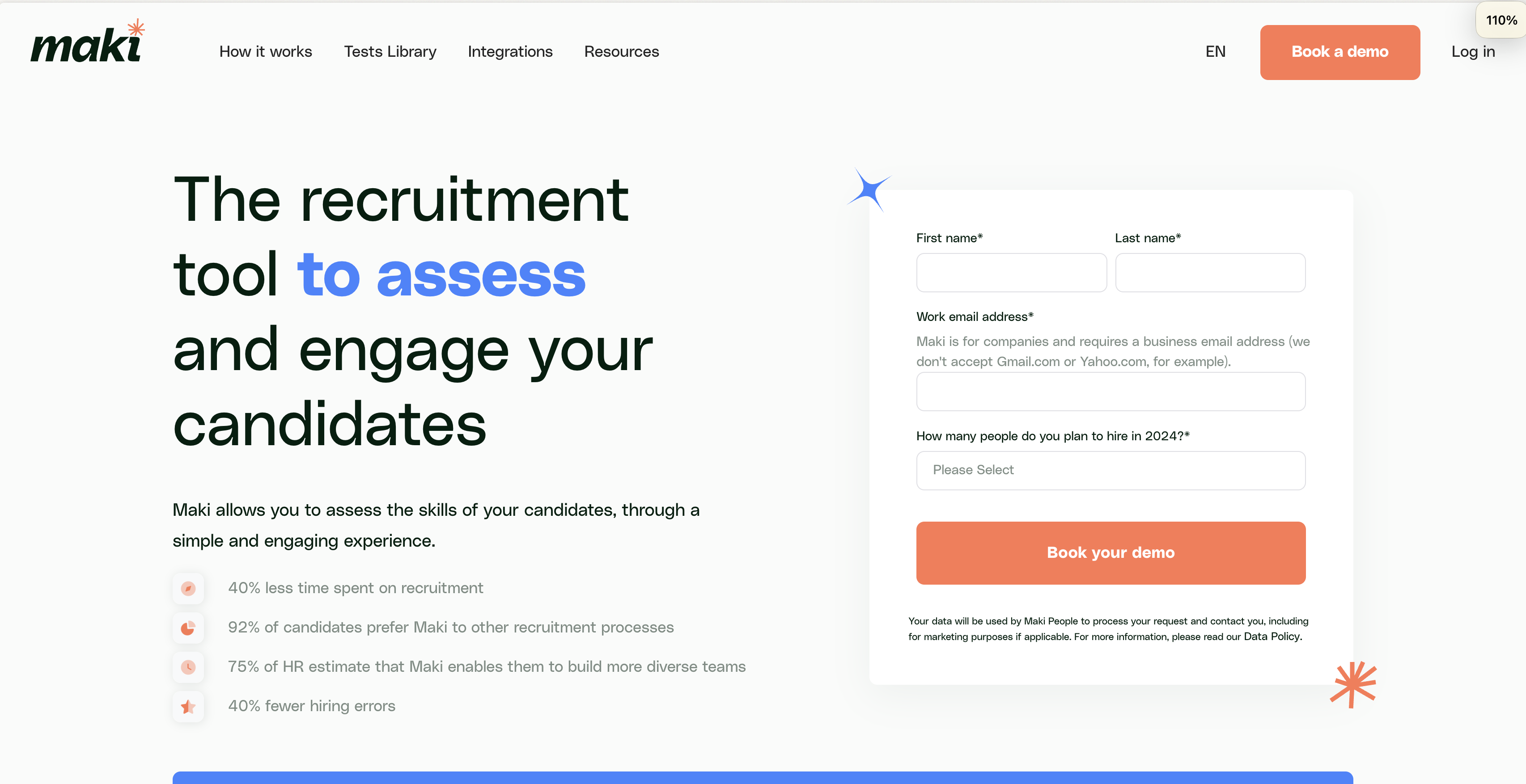
Maki People offers a range of pricing options, but it seems like they prefer the mysterious route—details are a bit scarce. Here's a glimpse of what they have:
- Individual Plan: Pricing available upon request.
- Starter Plans: Contact their team for pricing info.
- Scale Plans: No pricing disclosed.
- Growth Plans: Pricing not available publicly.
- Enterprise Plans: No info shared.
- Unlimited Plans: Not offered.
While they have different plans, potential customers might find it tricky to figure out what fits their needs without a little detective work.
One thing that stands out is the lack of transparency in Maki People's pricing structure. Without a straightforward way to see costs or explore features, companies may feel compelled to engage in lengthy conversations with sales reps just to get simple answers. In contrast, having accessible pricing and the ability to explore features freely can significantly ease the decision-making process for businesses looking to hire effectively.
Comparison of pricing
Adaface vs Maki People: Scorecards, reporting and analytics
Good scorecards, reporting, and analytics features help recruiters make data-driven hiring decisions. They provide clear insights into candidate performance, allowing teams to compare applicants and identify top talent quickly. The right tools can streamline the hiring process and improve the quality of hires.
Adaface scorecards, reporting and analytics
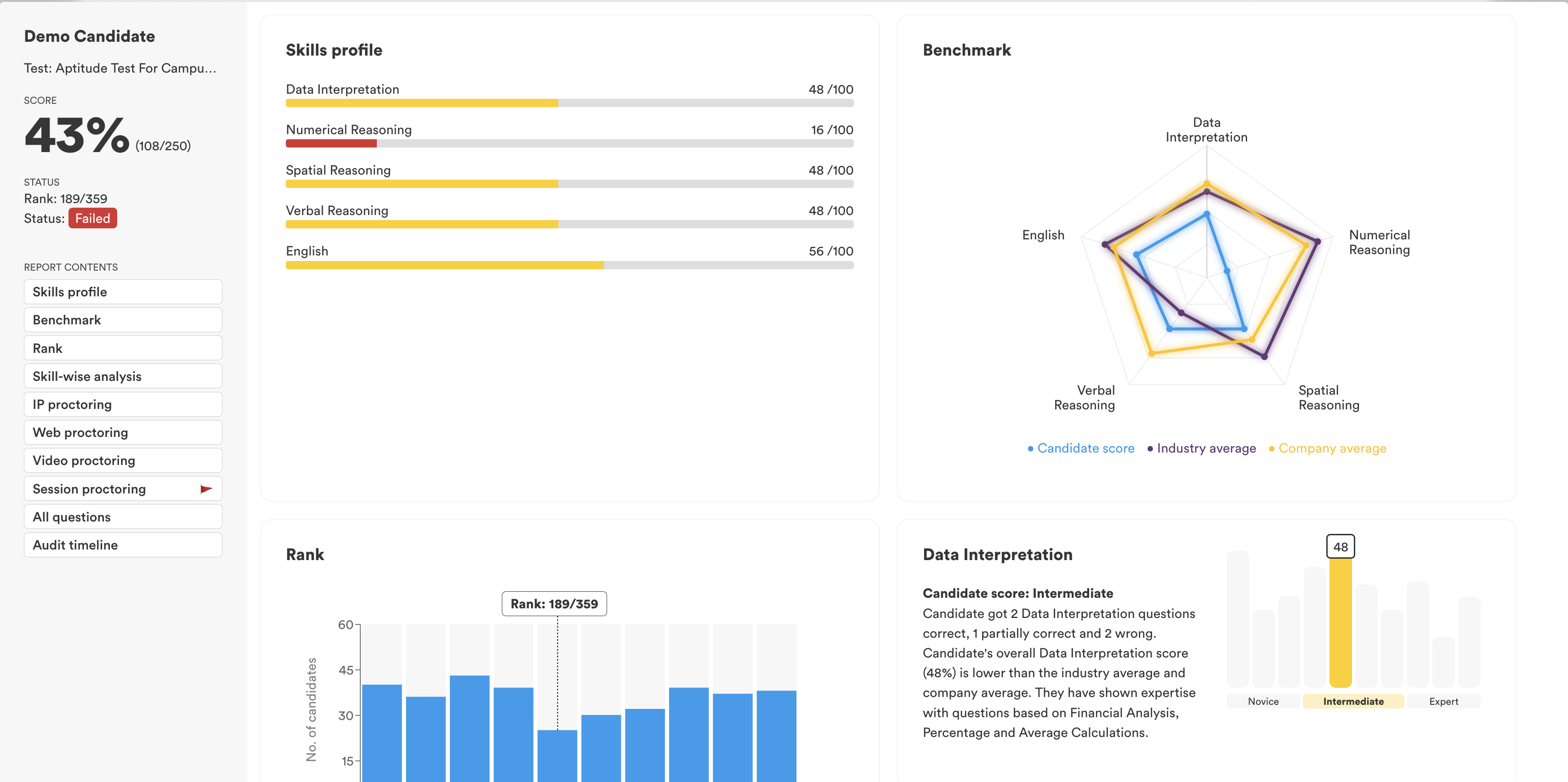
Adaface offers detailed scorecards that give recruiters a complete picture of candidate performance. These reports include overall scores, skill-specific breakdowns, and benchmarking against other applicants. Recruiters can easily share results with team members or clients through PDF reports or unique public links.
The platform's analytics go beyond basic scoring. Adaface provides a skills profile for each candidate, showing strengths and areas for improvement across multiple competencies. This information is presented in an easy-to-understand radar chart, comparing individual scores to industry and company averages. For a deeper dive, recruiters can access a full audit timeline of the assessment process.
Maki People scorecards, reporting and analytics
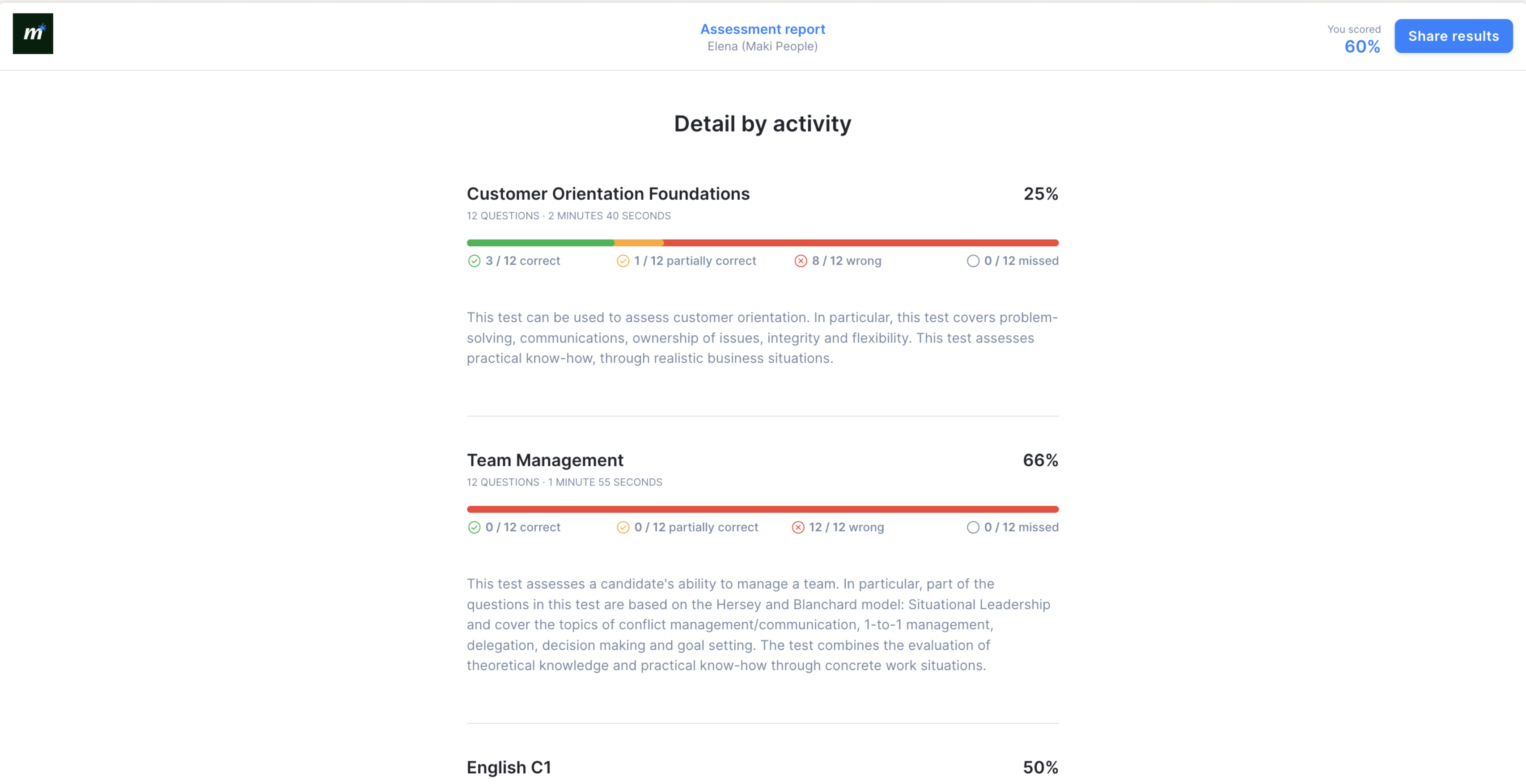
Maki People offers reporting and analytics features to help recruiters evaluate candidates. Their platform generates skills profiles and provides skill-wise analysis, giving a quick overview of a candidate's performance across different areas.
The system allows for benchmarking, comparing candidates against others in the pool. Recruiters can export candidate scores in Excel and CSV formats for internal evaluation, and there's a comprehensive overview feature for comparing multiple candidates at once.
While Maki People offers useful reporting tools, it lacks some features that could enhance the recruitment process. For instance, there's no option for PDF reports or public sharing of scorecards, which might limit how easily information can be distributed to team members or clients.
Comparison of scorecards, reporting and analytics
Adaface vs Maki People: Enterprise and startup friendliness
When choosing a pre-employment testing platform, look for features that support companies of all sizes. ATS integration, GDPR compliance, and API access are key for both startups and large enterprises.
Adaface's enterprise and startup friendliness
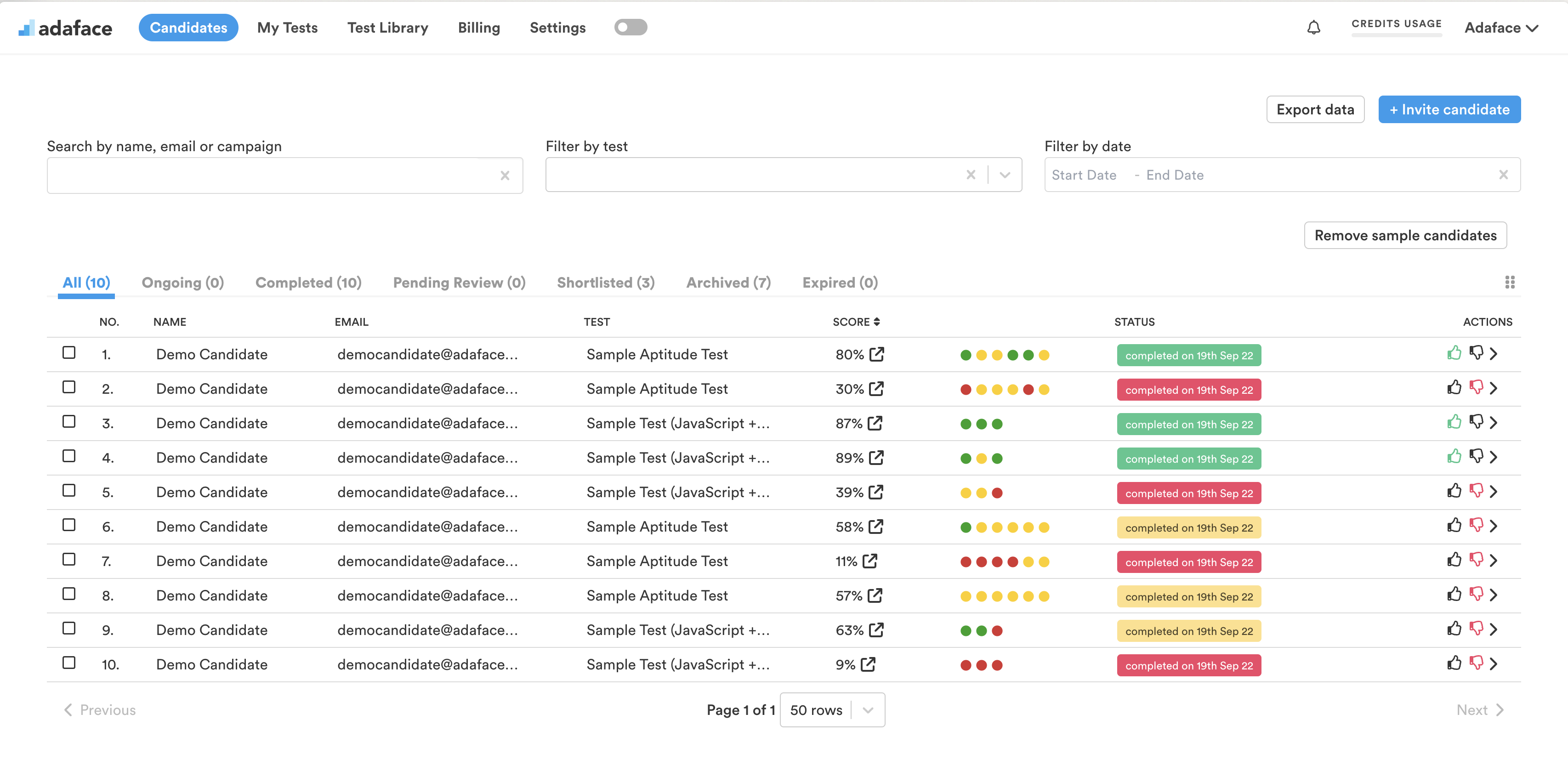
Adaface offers a range of features tailored for businesses big and small. With ATS integrations and GDPR compliance, it fits seamlessly into existing workflows while meeting regulatory requirements.
For enterprises, Adaface provides custom API access and role-based permissions. These allow for tighter integration with HR systems and granular control over user access - perfect for complex organizational structures.
Startups benefit from Adaface's unlimited team seats and multiple invite options. These features enable cost-effective scaling and flexible candidate management, supporting growth without breaking the bank.
Maki People's enterprise and startup friendliness
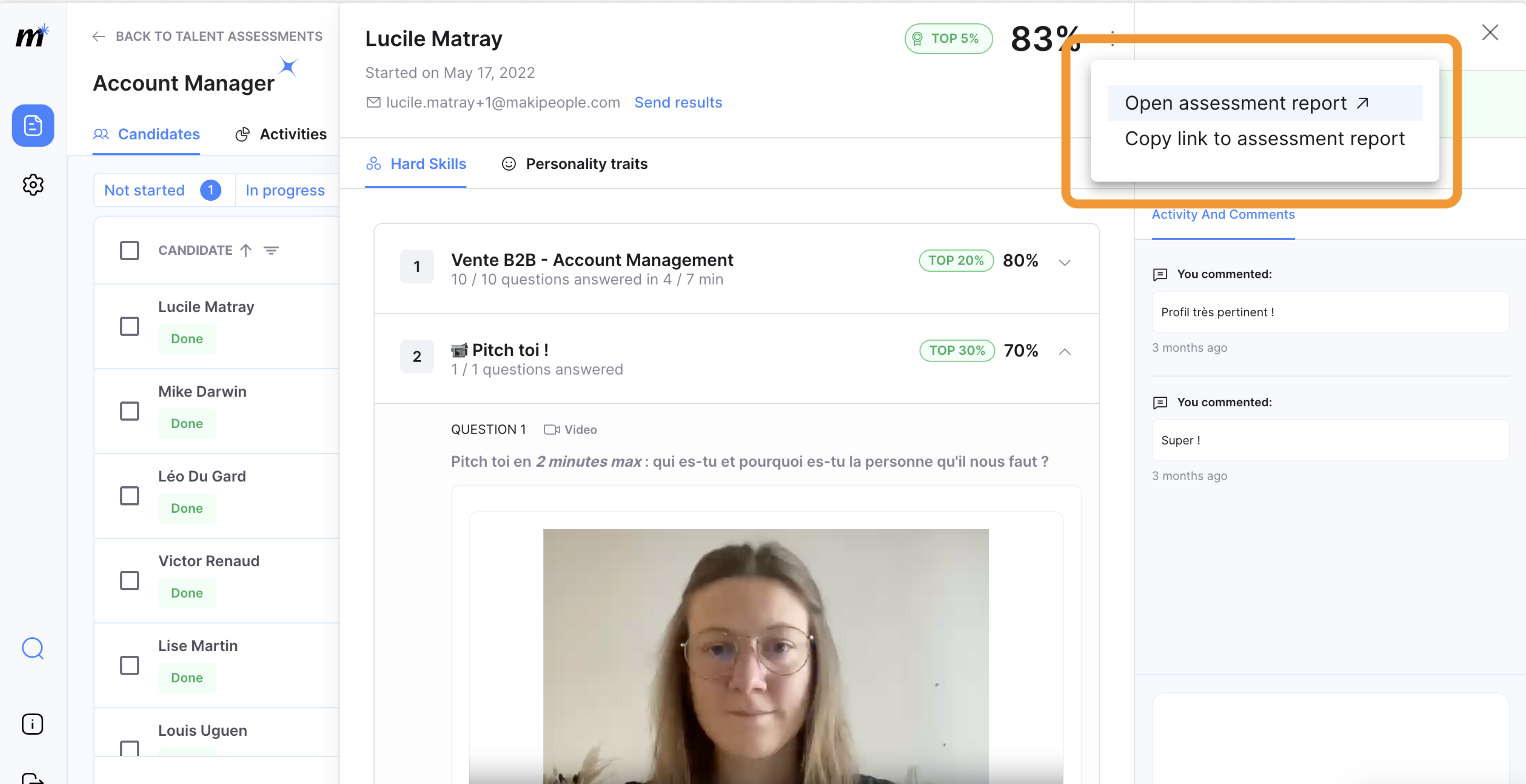
Maki People offers ATS integrations and GDPR compliance for enterprise users. They provide role-based access and multiple invite options for team management. Their platform supports bulk actions for large-scale hiring events.
For startups and enterprises, Maki People allows tracking candidate stages throughout the hiring process. This feature helps recruiters manage their candidate funnel from initial contact to final decision.
However, Maki People lacks custom API support and doesn't offer unlimited team seats. There's also no indication of multiple question sets or custom data location support for added security measures.
Comparison of enterprise and startup friendliness
Adaface vs Maki People: Assessment quality control
Quality control in assessments ensures the accuracy and reliability of test results, which is crucial for making informed hiring decisions. It involves rigorous checks before and after tests go live.
Adaface's quality control features
Adaface’s quality control process includes candidate feedback, social listening, and multiple quality checks before questions are published.
We actively replace questions once they hit certain usage limits to keep them fresh and relevant.
Our proprietary algorithms continuously evaluate the quality of questions and tests in our library.
To see the science behind how we design our questions, visit how we design questions at Adaface.
Maki People's quality control features
Maki People implements quality checks before their questions go live to ensure the integrity of their assessments. This initial review step helps in filtering out any low-quality content that may not effectively evaluate candidates.
Unfortunately, there is little information available about Maki People's use of candidate and customer feedback to refine their tests. Without transparent feedback loops, it's uncertain how they address or incorporate user experiences to enhance the quality of their assessments.
Moreover, Maki People does not seem to employ proprietary algorithms to analyze and improve the quality of questions in their library. This absence may result in a lack of data-driven insights to ensure test questions remain relevant and effective.
Comparison of quality control
Adaface vs Maki People: Customer support
When it comes to pre-employment testing, good customer support can make or break your hiring process. It's like having a friendly guide to help you navigate through the assessment jungle, making sure you don't get lost in the tech wilderness.
Adaface's customer support features
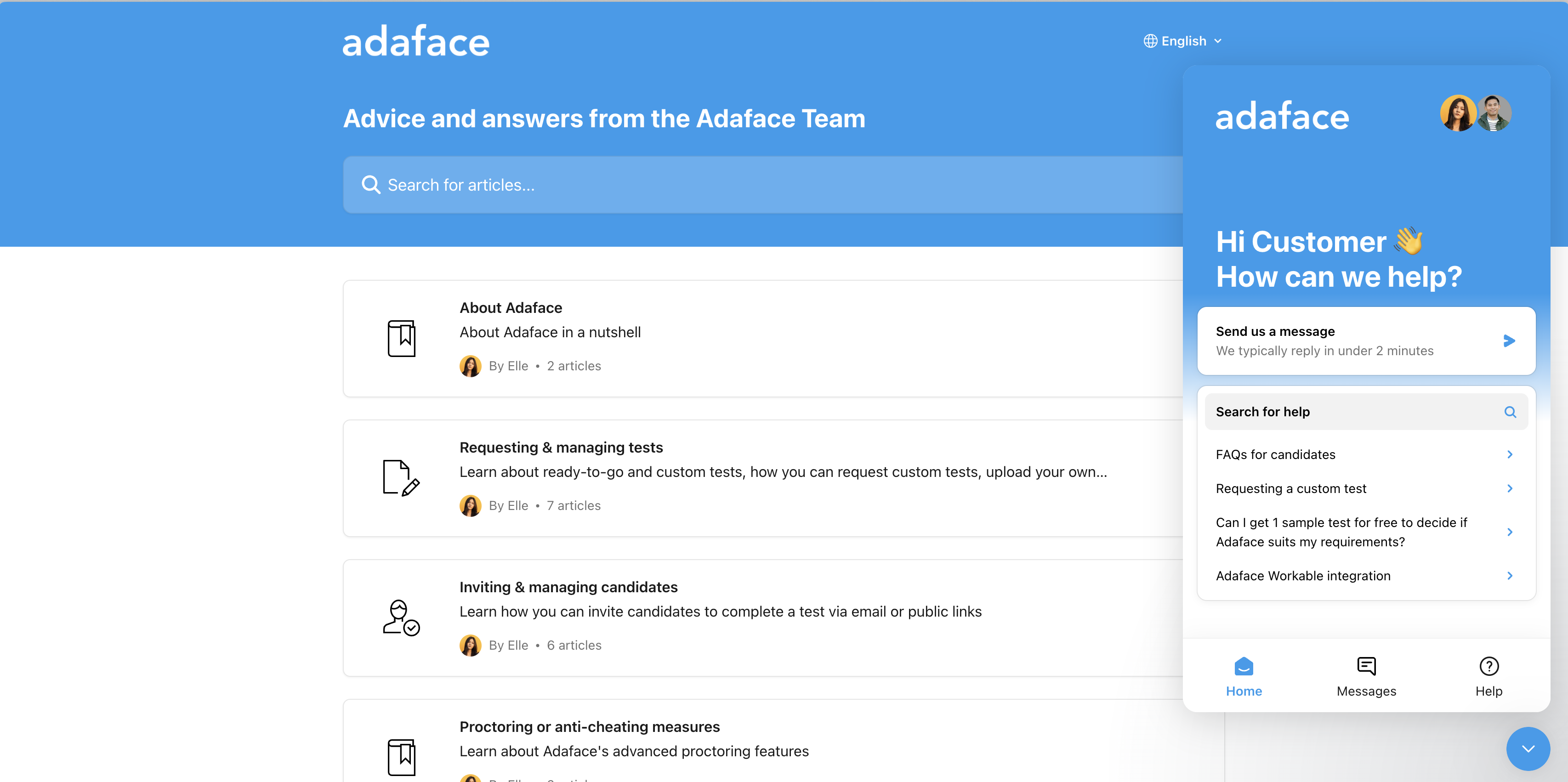
At Adaface, we've got your back with multiple support channels. Our team is ready to assist you via email and live chat, so you're never left scratching your head. It's like having a tech-savvy friend on speed dial!
We've also built a comprehensive help center that's packed with answers to common questions and how-to guides. It's your go-to resource for becoming an Adaface pro.
To get you started on the right foot, we offer personalized training and onboarding. Our team will walk you through the platform features, ensuring you're comfortable using Adaface for your hiring needs. It's like having a personal tour guide for your assessment adventure!
Maki People's customer support features
Maki People offers email support and has a help center, providing resources that can answer many common queries for users. However, the absence of live chat means users might find it difficult to get immediate assistance when they need it most.
While Maki People has helpful resources, they lack dedicated priority support and training for onboarding, which can leave users navigating the platform on their own. A structured support system can make a significant difference in how effectively recruiters utilize assessment tools.
Comparison of customer support
Adaface vs Maki People: Conclusion
Both Adaface and Maki People offer programming tests, aptitude tests, and personality assessments. They also support custom questions and provide automated scoring for coding questions.
Even with these similarities, Adaface stands out due to its conversational interface and mobile-friendly design, which enhance the candidate experience. Adaface also provides a wider range of integrations and customizable options.
Maki People lacks some critical features like situational judgment tests, typing tests, and cloud tests beyond AWS. These gaps limit its versatility in assessing diverse candidate skills.
Streamline hiring with skill tests
On the other hand, Adaface covers a broader spectrum of tests, including AI, cloud, and job-specific assessments. Adaface's customizable tests based on job descriptions ensure a precise evaluation tailored to specific roles.
Pre-employment assessments streamline the hiring process by providing a clear view of candidate abilities. Platforms like Adaface offer a variety of tests to match different job roles and requirements.
Using these assessments, recruiters can make informed decisions quickly, saving time and ensuring they select the best fit for each position. This leads to more effective hiring outcomes.
Adaface emerges as a comprehensive solution for pre-employment assessments with its extensive test library, customization options, and superior candidate experience. To explore more, check out our Platform Features and learn about Skills Assessment Tools.
Adaface vs Maki People FAQs
Adaface offers a wide range of tests including programming, situational judgment, aptitude, business, personality, language, finance, AI, and cloud tests. Maki People offers programming, aptitude, business, personality, language, finance, and cloud tests.
Adaface creates custom tests based on job descriptions, ensuring accurate assessments. Maki People does not offer customized tests per job description.
Both platforms use user authentication and offer webcam proctoring. Adaface also provides additional features like IP and device fingerprint proctoring, which Maki People lacks.
Adaface supports mobile for most assessments. Maki People does not offer mobile support.
Yes, both Adaface and Maki People allow recruiters to add their own questions to the assessments.
Yes, both Adaface and Maki People integrate with ATS systems, making it easier for enterprise users to manage their hiring processes.

40 min skill tests.
No trick questions.
Accurate shortlisting.
We make it easy for you to find the best candidates in your pipeline with a 40 min skills test.
Try for freeRelated posts



